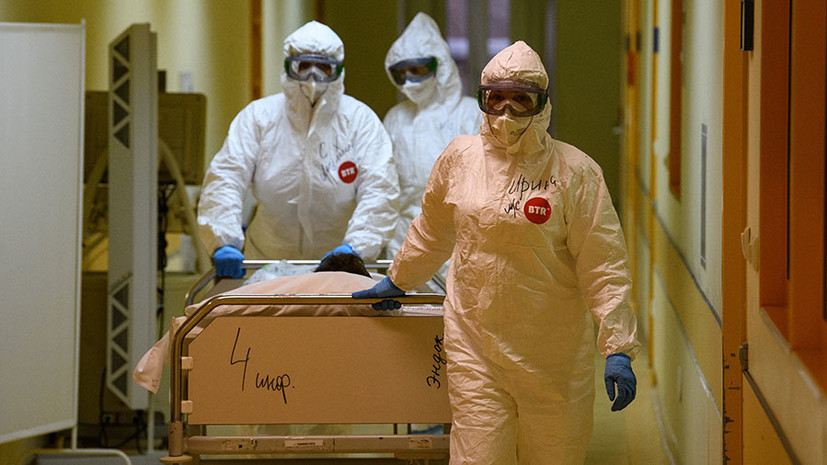The Russian government has approved a plan of additional measures to combat the spread of the SARS-CoV-2 coronavirus omicron strain in the country and prepare the healthcare system to help the sick, the press service of the Cabinet reported.
A separate block of instructions from Prime Minister Mikhail Mishustin concerns medical care provided to patients with COVID-19.
“The Federal Compulsory Medical Insurance Fund (FFOMS), together with its territorial divisions and health insurers, must ensure the transfer of the results of an examination of the quality of such care to the regional ministries of health for evaluation and prompt response by January 24,” the report says.
In addition, the Ministry of Health of the Russian Federation, together with the Ministry of Digital Development, was instructed to prepare and send to the regions by January 24 revised standards for the number of operators of the unified operational assistance service (hot line 122) with medical training.
Specialists from these call centers help reduce the burden on clinic registries by advising Russians on issues related, among other things, to the coronavirus.
Taking into account the growth in the number of calls, it is planned to involve students of medical universities and colleges in this work.
At least 300 million rubles will be allocated monthly to pay for their work.
Another instruction of the prime minister concerns the reasonableness of prices for PCR tests for the diagnosis of COVID-19.
The Federal Antimonopoly Service has been ordered to carry out an appropriate check before February 1.
Latest incidence data
Over the past day, 9902 people were hospitalized in Russia, which is 8.4% more than on the previous day.
57,212 new cases of coronavirus were detected, during the same time 25,525 people fully recovered.
During the day, 681 patients died from complications that developed against the background of COVID-19 and concomitant diseases.
More than 800 new cases were confirmed in Moscow (16,094, 1,077 people were hospitalized), St. 863), Rostov (838) and Sverdlovsk (823) regions, as well as in the Stavropol (807) and Krasnodar (805) regions.
According to the headquarters, the “delta” variant was detected in 51.9% of cases of COVID-19, the “omicron” strain and other non-dominant variants were found in 48.1% of cases across the country.
For the entire period of observation in the Russian Federation, 11,044,986 episodes of coronavirus have been confirmed.
10,000,577 people have recovered, 325,433 have died.
Also on russian.rt.com Biologist Tonevitsky said that "omicron" contains more than 50 mutations
Vladimir Chulanov, chief freelance infectious disease specialist at the Russian Ministry of Health, said that about 5% of people get sick with coronavirus again.
“We cannot say that we all get sick three or four times.
5% maximum, even with “omicron” now, they fall ill again, this is a small percentage, ”he explained on the air of the You-Tube channel“ Let me tell ”.
Chulanov noted that this category includes people who, for various reasons, have poorer health and weaker immunity.
In turn, adviser to the president of the Center for Strategic Research, candidate of biological sciences Yevgeny Tonevitsky stated that the omicron strain has more than 50 mutations, which reduces the incubation period, but now the virus prefers to multiply in the upper respiratory tract, and not in the lungs.
“The dominant“ omicron ”contains more than 50 mutations compared to the original strain, of which more than 30 are in the S-protein (coronavirus. -
RT
), and more than ten of them are in the predator fragment with which the virus interacts with the victim cell” , - RIA Novosti quotes Tonevitsky.
According to the specialist, some mutations increase the speed and efficiency of virus entry into the cell, while others hide the "omicron" S-protein from antibodies that were formed after the disease or vaccination.
“Most of the vaccines that exist today in the world, created both on the basis of adenoviruses and using RNA, promote the formation of antibodies against the S-protein.
Once bound to antibodies, the activity of the protein is blocked and the virus cannot enter the cell,” he said.
Application for outpatient use MIR 19
The Federal Medical and Biological Agency (FMBA) of Russia submitted an application to the Ministry of Health for a post-registration clinical trial in the outpatient department of the medicine for coronavirus infection MIR 19 in the first days after the confirmation of the diagnosis of COVID-19.
At the end of December, this drug was included in the interim guidelines of the Ministry of Health for use in a hospital setting.
As noted in the FMBA, the drug is successfully used to treat patients with COVID-19.
The drug is administered by inhalation using medical nebulizers.

